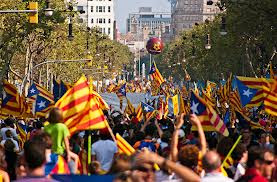Europe faces an unprecedented attempt by two regions to form new
states in 2014 after politicians in Catalonia reached an agreement to
call a referendum in the same year that Scots will be asked whether
they want independence.
A basic agreement between nationalist Catalan president Artur Mas and
the separatist Catalan Republican Left (ERC) party will result in the
latter propping up Mas's new minority government.
The price for support is the setting of a time limit on a
self-determination referendum. Mas had promised to hold one by 2017
but ERC has forced him to commit to 2014, according to Spanish press
reports citing those involved in negotiations. The agreement with ERC
will allow Mas, who remains in power despite losing parliamentary
seats in elections last month, to form a new government shortly,
according to the reports.
Officials in Mas's office declined to confirm or deny the deal with
ERC, but the move looks likely to increase confrontation with Spanish
prime minister Mariano Rajoy's conservative People's party (PP)
government, which has said it would make sure that courts banned a
unilateral referendum in advance. If Mas ignored a ban imposed by the
constitutional court, he could face trial and be barred from public
office.
The decision to hold the Catalan referendum in the same year as the
Scottish vote creates a double headache for the EU. Officials have so
far maintained that newly independent countries must apply for EU
membership – which normally takes many years and can be vetoed by a
single member state.
Mas's Convergence and Union (CiU) nationalist coalition is split on
whether Catalonia, a wealthy and populous region in north-east Spain,
should seek full independence. Mas and most others want secession, but
a significant minority worry that this could damage Catalonia's
economic interests.
Mas called a snap election last month hoping to ride a wave of
enthusiasm for independence and persuade Catalans he was the man to
lead them towards separation from Spain. CiU won, but with its worst
result since 1980 as voters punished it for the austerity measures it
has imposed on welfare, education and health services in a region that
already enjoys considerable autonomy. Hardcore separatists voted for
ERC and those opposing independence, many of whom would not normally
vote at regional elections, backed Rajoy's PP or other
anti-separatists - producing a fragmented parliament.
Mas's alliance with ERC, which doubled its number of deputies to
become the second biggest party, means pressure for independence will
now increase.
Polls show 57% of Catalans say they would back separation, though
analysts believe that would drop significantly in a real referendum
where fears about damage to Catalonia's economy would become sharper.
In the Basque country, the northern Spanish region where independence
is often debated, a new nationalist-led government began to take shape
on Thursday.
Iñigo Urkullu, of the Basque Nationalist party, was appointed regional
prime minister and looked likely to head a minority government that
will also need the support of separatists. Urkullu has said his
priority is the economy, but the separatist Bildu coalition that
includes former members of the political front of terrorist group Eta,
will try to push him down the road towards independence.
Urkullu was expected to keep a close eye on events in Catalonia and
Scotland before deciding whether to push for independence.
http://www.guardian.co.uk/world/2012/dec/13/catalonia-independence-2014

No comments:
Post a Comment